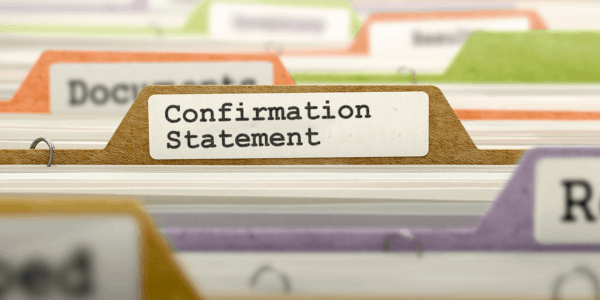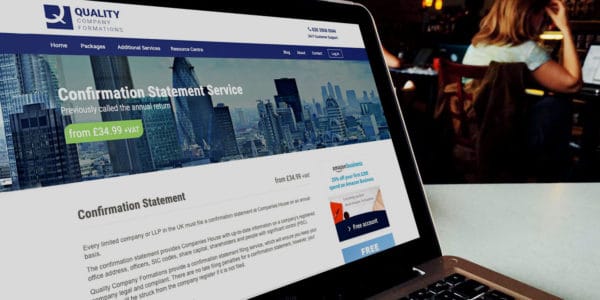All limited companies are required to file a confirmation statement each year. In this blog, we will outline some of the consequences of failing to submit a confirmation statement. But first, let’s recap the purpose of a confirmation statement.
Why do companies need to file a confirmation statement?
A confirmation statement is essentially confirmation by directors that the company information held by Companies House is accurate and up to date. All companies are required to file confirmation statements – including those which are dormant or non-trading.
Even if all of the information is exactly the same, directors must file a confirmation statement at least once every 12 months. Each 12-month period is known as a review period. Missing the submission deadline can result in a variety of problems for the company and its directors.
What happens if you do not file a confirmation statement?
Company directors have a legal duty to file confirmation statements under section 853A of the Companies Act 2006. Failing to do so can result in personal liability, fines, prosecutions, and even the company being struck off the register.
Failure to file a confirmation statement is dealt with by section 853L of the Companies Act 2006. Under this section, if a company does not deliver a confirmation statement on time, an offence is committed by:
- the company
- every director of the company (including shadow directors)
- every secretary of the company (where applicable)
- every other officer of the company who is in default
If a company does not file a confirmation statement, both the company and its officers may be subject to prosecution as a result of breaching the Companies Act 2006. Fines of up to £5,000 can be levied on each of the company officers.
Directors can receive disqualification orders precluding them from holding company officer posts for a certain number of years. The company can also be forcibly dissolved and struck off the register.
Failing to file confirmation statements is a criminal offence and directors can be personally fined in the criminal courts. Any criminal proceedings for not filing confirmation statements are separate from – and in addition to – any late filing penalties issued by Companies House against the limited company.
Aside from the statutory penalties, failing to maintain the accuracy of corporate information held at Companies House and disclosed on the public register can affect the creditworthiness of a company.
Furthermore, any discoveries of inaccurate or out-of-date information on the public register during a due diligence exercise could lead to problems with securing investment or succeeding in planned takeovers or mergers.
What happens if you file late?
If a company does not file a confirmation statement by the relevant deadline, it can still be filed late. There are no automatic financial penalties for failing to file a confirmation statement on time.
Companies House will generally issue an automatic warning if you miss a filing deadline. This will serve as an initial reminder, providing an opportunity for the company to bring its filing responsibilities up to date without being penalised.
If reminder notices are ignored, Companies House will eventually take action against the company and its officers. As discussed above, this can result in fines for company directors and the company being struck off the register, as well as director disqualification.
How can I make sure that I file on time?
Company directors need to ensure they file a confirmation statement at least once in every 12-month review period. For new companies, this review period begins on the date of the company incorporation. For companies that have already submitted a confirmation statement, review periods begin on the date the last confirmation statement was submitted. Therefore, the deadline can vary if the confirmation statement is filed early.
The company must file a confirmation statement at least 14 days after the end of each relevant review period. Although it can be submitted earlier, filing a confirmation statement early will automatically trigger the next 12-month review period. Therefore, you should only do so if you need to update certain details immediately for a specific reason (e.g. for securing a bank loan or investor funding).
Submitting a confirmation statement earlier in the review period can also help to ensure that it is submitted in good time. Moreover, avoiding that last-minute rush to file on time can reduce the likelihood of making a mistake.
Another method of avoiding confirmation statements being missed or overlooked is to sign up for email reminders from Companies House. Once set up correctly, this service will send out an email notification reminder regarding the due date of a confirmation statement.
Payment periods
Aside from their duty to prepare a confirmation statement each year, company directors must also remember to pay the annual fee. This fee covers the filing of any confirmation statements submitted during a certain period of time, known as the payment period – distinct from the review period.
In respect of new companies, the payment period runs for 12 months from the company incorporation date. For older companies, the payment period is 12 months from the date of the last payment.
Companies can file confirmation statements multiple times during any specific payment period; there is no additional payment. The annual fee only needs to be paid when a company files the first confirmation statement in a payment period.
What information do I need to include when I file a confirmation statement?
The first step is to check the details of your company currently held by Companies House, which can be viewed online. Ensure that any company details which are out of date are updated as appropriate. Some of these details can be updated using the confirmation statement, including:
- Principal business activities or standard industrial classification (SIC)
- Statement of capital
- Trading status of shares
- Exemption from keeping a register of people with significant control (PSC)
- Shareholder information
Other information may need to be updated using the online services at Companies House, such as:
- Registered office address
- Single Alternative Inspection Location (SAIL)
- People with Significant Control (PSC)
- Company directors and secretary
- Registered email address
Even if there are no changes to report, it is still necessary to file a confirmation statement.
Please note that the information provided in this article is for general informational purposes only and does not constitute legal, tax, or professional advice. While our aim is that the content is accurate and up to date, it should not be relied upon as a substitute for tailored advice from qualified professionals. We strongly recommend that you seek independent legal and tax advice specific to your circumstances before acting on any information contained in this article. We accept no responsibility or liability for any loss or damage that may result from your reliance on the information provided in this article. Use of the information contained in this article is entirely at your own risk.







Join The Discussion